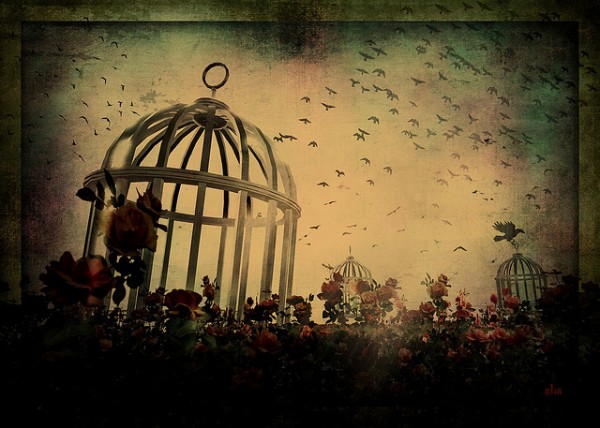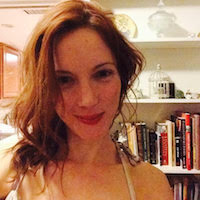Let’s admit it, we are all a tiny bit obsessed with love.
Our news feeds, inboxes and lives are inundated with love propaganda: how to find love, how to make love last and what to do when love is lost.
I swoon at the sight of the moon, and I hear music in the snores and heartbeats of someone I love. I’ve lost love to death, anger and the cold apathy of neglect.
In the Buddhist world, we are taught that attachment is the root of all suffering, and never is this more apparent than in our wanton pursuit of amor.
I’ve thought long and hard on how to love properly, without attachment. I once read a piece of modern philosophy by poet David Whyte that stated friendship is the highest form of love. Despite hours pondering how this correlates to the teachings of non-attachment in our romantic relationships, I was unable to fully understand what this meant to me and how it affected my relationships—until I loved two very different men.
The following is the story I wrote to my ex-boyfriend when we broke up:
There once was a lonely man. One day, during a storm, a beautiful bird came to rest on his window sill. Her plumage was extraordinary, gold and bright, but her wingtips were heavy with the rain. She sought shelter. The bird asked the man if she might rest in his window until the storm passed.
She said, “In exchange for the safety of your house, I’ll sing to you.”
Her lullaby soothed his woes and helped him to sleep as one who is truly loved. The man came to believe he needed the bird to ease his loneliness. She became his reconnection with the living earth that held him.
When the skies had cleared, the bird, being a bird, desired to flutter about the meadows and soar over the mountain peaks. She was searching, not for another window sill, but for all the forgotten beauty in the world. She loved the gnarled broken branches of the old oak trees near his home, the river that brought life to all the animals and the fire of lightning that destroyed everything so that life could begin anew.
She breathed with the change of seasons and reveled in the glory of the stars.
The bird was gone for some time. One day, she returned to visit the man, for she loved him, and she remembered the safety of his window sill.
She found the man distraught and haggard, and he seemed to be aging with his worry. “Bird! Where have you been? You abandoned me and I can’t sleep. Please, bird, stay and sing me a song.”
Her heart was moved and she obliged. While she was singing, the man stroked her feathers and hummed along in happiness. Suddenly, the man caught her. He scooped her up and placed her in a golden cage adorned with jewels and the finest perch, situated in the sunlight of the kitchen.
“What are you doing?” she cried.
“I’m afraid you’ll leave again,” he said. “I’m fearful you’ll get caught in another storm, be injured or find a prettier window to rest in. Please, bird, let me keep you. Sing me to sleep every night and I’ll protect you.”
He praised her daily, fed her the freshest fruit and loved her.
However, after some time, the bird stopped eating, and her feathers began to molt. “Bird! What is wrong with you? I care for you, I tell you how beautiful you are. Here, you are protected. You will never be alone or have to weather another storm in the valley. No one will hunt you or pluck your feathers. Please bird, sing some more! Why are you wilting?”
She replied, “Because I’m a bird, and you put me in a cage.”
With the first man, I felt as if I’d fallen into a spin cycle, unsure, overwhelmed and confused about the disparity between what I thought I wanted, what I needed and what the actual nature of our relationship was. He was wise enough to put distance between us so as to temper the pain and slow down the progression of our intimate friendship.
With the second man, I was the one to put the brakes on our budding romance.
I now believe all relationships, no matter their nature, should be based in friendship. With our non-romantic relationships, we often show a great deal more patience and forgiveness toward the other party. In order to have a friendship, both parties need to participate, and we do not impose rules upon them. We take their decisions less personally and don’t believe their actions require our permission or approval. We accept these people as they are, wherever they are at, without the desire to chain, change or conform to fill a void.
When we turn the corner into romance, the intimate nature of the relationship brings forth our insecurities. We often latch onto the other out of a fear of loss or loneliness. “You” and “me” become “we,” and we may suddenly find ourselves demanding our significant other meet the stipulations we have set for a romantic partnership.
What if we treated our significant other as a friend?
If we recognize that they have already chosen us, perhaps it will be easier to let go, so that our love does not become a gilded cage. We can strive to recognize the people in our lives as having qualities inherently different from our own, and love them for their happiness—not the happiness we think they might bring to our lives.
“Love in such a way that the person you love feels free.” ~ Thich Nhat Hanh
My desire to be loved as I am, with all of my beauty and all of my flaws, taught me to accept the ones closest to me and try to see them exactly as they are, not as I want them to be. I’m learning to forgive myself for mistakes and overlook what I perceive to be shortcomings in others.
We all have to honor our own growth process. I want the happiness of my loved ones more than the fulfillment of my own desires.
To me, this feels like love. This is non-attachment.
Birds always look most beautiful in flight. It is in the sky that they reveal their glory, their happiness, living as they were created to live. People are the same way.
No matter where you are in your growth process, no matter what you desire, I love you.
Love me with an open hand, and I’ll love you for free.
~
Relephant read:
Letting Go in Relationships: A Buddhist’s View of Attachment.
~
Author: Ann Marie Matthews
Editor: Toby Israel
Image: Alia Qunhua/Flickr
~









Read 3 comments and reply